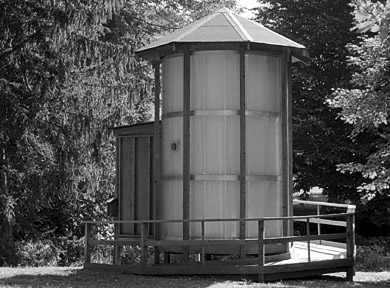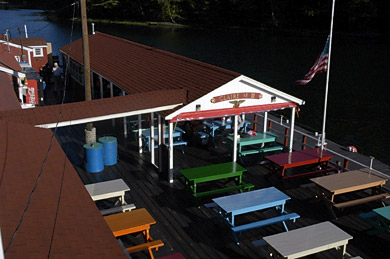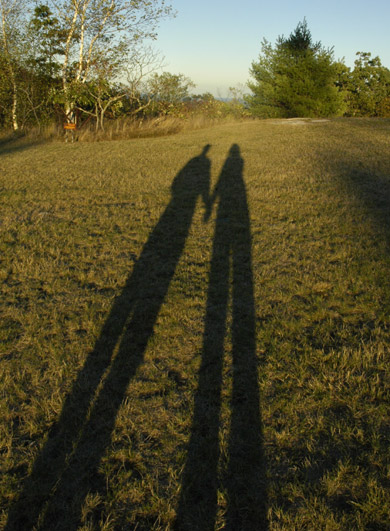I Thought It Would Be Darker...
Recently we went to the Morris Arboretum for an afternoon visit. The Arboretum features some non-botanical attractions integrated into the landscape, including a garden railway and a number of sculptures. Tucked away off the beaten track is the small building pictured below. It’s a camera obscura, not something you see every day—or any day, for that matter.
Camera obscura means “dark room” in Latin. An apt choice of name, both for language (since camera obscuras probably date to a time when people actually spoke Latin) and because a dark room is really all it is. A dark room with a hole, that is. Light from outside passes through the hole and through the magic of physics (or is it the reverse?) forms an upside-down image on the opposite wall. (See Wikipedia or this appreciation for more information.) This camera obscura is cylindrical and is equipped with two lenses on opposite sides so that the entire interior is covered with a panoramic image of the garden.
I had never seen a camera obscura before, so I wasn’t sure what to expect. I assumed that the image would be very dim, and that it would take some time to become accustomed to the darkness. On the contrary, I was surprised at how bright the image was—no adjustment required. The brightness was due no doubt to the large aperture (which was fitted with a lens). Unfortunately, large apertures sacrifice depth of field to achieve brightness, so much of the image was out of focus. Even with that defect, it was a new visual experience similar to yet quite unlike watching a movie in a theater. Taking a picture of it is impossible, since much of the charm comes from the fact that the image is moving.
The Arboretum’s camera obscura was created by artist Richard Torchia. He calls the installation “A Key to the Garden,” and it really does open a door to a unique view of the garden.

Camera obscura by Richard Torchia at Morris Arboretum.
Back to Work
Ugh. It was back to work today after a blissful week in the southern part of Maine (aka Vacationland!). Except for one rainy day (thanks to the remnants of Ophelia, I believe), the weather was perfect. Although the trip was built around lobster-roll destinations, we spent more than the usual amount of time away from civilization discovering new trails through the many wetlands and preserves.

As enjoyable as that was, neither of us could quit the internet for a whole week, so we found an internet cafe not far from our place called Sister Mary Catherine’s. Rich coffee, delicious scones, and high-speed access. Woo-hoo! (Sounds just like home, actually.) Still, this was a vacation away from computers, so we only stopped in twice, and I had no trouble taking a break from blogging.
Herewith, then are a few highlights of the trip in photographs taken mostly by Anne. I restricted my photographic efforts to documenting the 17 lobster rolls I enjoyed (reviews of which will trickle into the food section eventually).

A wetland that is part of the Wells Reserve at Laudholm Farm.

The Portland Head Light photographed by Anne—my favorite picture of the trip.

One view of Chauncey Creek Lobster Pier in Kittery Point. Not one of the best lobster rolls, but one of the most picturesque settings.

Watching the sunset at the top of Mount Agamenticus in York County.
My Accordion Story
This is old news now, but I noticed that Becky of Good Grief! got an accordion for her birthday. What an excellent gift, although it may be like me getting a set of golf clubs. Cool, but pointless, as I have no ability for the game.
The long-suffering accordion has been unfairly singled out among musical instruments as the butt of countless insults over the years. A typical example is a cartoon by Gary Larson. The caption: “Welcome to heaven. Here’s your harp. Welcome to hell. Here’s your accordion.”
In the past, I laughed as hard as anyone at accordion jokes, but in recent years I’ve acquired respect and admiration for the instrument. Accordions are actually kind of hip now. (The same transformation happened to me with the bagpipes; I even considered joining a pipe band, although playing drums.) Anyway, on to my story.
I used to work with a wonderful accordionist named Tony DiGiulio. Tony reminisced that “in the old days” (as he put it), he would drop off his accordion on the steps of the Bellevue Stratford Hotel and then drive off to look for a place to park. Tony’s lesson for us young whippersnappers was that in the old days, he didn’t have to worry about someone stealing his accordion. I quipped, “Nobody stole it because it was an accordion!” Everyone got the joke, of course (even Tony laughed graciously), but now, if a collection of instruments just happened to be sitting unattended on some hotel steps somewhere, it wouldn’t surprise me in the least if the first instrument stolen were the accordion!
First Watermelon
I’ve been meaning to take some pictures of our homegrown watermelons, but still haven’t gotten around to it. The crop has yielded five bouncing baby melons, some seedless and some seedful (a necessity when you grow the seedless kind). The watermelon foliage has snaked its way through the surrounding garden and almost taken over that side of the yard. Obviously it takes a lot energy to make a melon.
We had some friends over on Labor Day for some grillin’ and chillin’, and on that occasion Anne harvested the biggest of the watermelons. My contribution was to subject the melon to the “thump” test to determine ripeness. “Yep,” I declared confidently, “this here’s one ripe melon.” Wrong. That melon made a fool out of me. (No surprise, since it’s the first I ever tested.) When she cut into it, it didn’t look anywhere near ripe. The flesh was very pale, so we didn’t serve it (guests got Klondike bars instead). We tried some ourselves later, and it turned out to be surprisingly sweet and quite edible. Recently, one of Anne’s colleagues suggested an alternative serving suggestion. He thought we should have tapped the melon and injected it with vodka. Party melon! Yeah! Spiked melon balls would certainly liven up any fruit, um, cocktail and help kick things up a notch, but I’m not sure it wouldn’t ruin a perfectly good watermelon. If we ever get some vodka, it might make a worthy experiment.
Department of Corrections Department
It has come to my attention that there is a mistake in a recent post (in the second paragraph, “to work” is repeated is repeated). How this error got past the line editor, the copy editor, the managing editor, and the editor-in-chief here at mere cat, I'll never know. Probably what really happened is that the poor sap whose job it is to carry the finished pixels from the mere cat home office to the server tripped and dropped the package. Rather than telling anyone, he put the pieces back together as best he could. Oh, well. No harm done.
Still, I am calling for a full investigation.
That post was written like most of them—built up from fragments. My method is to splatter the page with key words and half-finished sentences, and eventually edit my way to complete sentences. Then I start moving the sentences around. Then paragraphs. And so on. Posts aren't so much written as rewritten.
I once read a list of metaphors that describe working styles. I use what is called the “pearl” method in which a tiny irritant is built upon layer by layer until a beautiful object is created. That describes my method except that the end result isn't anything you're likely to see adorning, let's say, Audrey Hepburn's neck.
It's because of the incessant editing that things like the doubled “to work” occur. Actually reading the post through would have helped, wouldn't it? I sure can't depend on a software solution. One of the titles that came in for criticism in that piece was Word. Word features a spelling and grammar checker, which can flag doubled words. It cannot, however, flag doubled phrases. I checked.
Like I said, no real harm done, and hey I got a whole post out of it! Is this where you say w00t?
The Empirical Photographer
I’ve been reading Mike Johnston’s photography column, “The Sunday Morning Photographer,” for some time. (It’s published on Photo.net and The Luminous Landscape.) Mike has compiled a book of his best photography essays called the The Empirical Photographer. Mike is an insightful as well as entertaining essayist, and I’m looking forward to reading the book. There is a 50-page sample for anyone who needs convincing of his talent. I rest my case.
When Software Jumps the Shark
Anything that evolves can misstep and jump the shark—in other words, reach a peak and then decline—even software. It’s an article of faith that software keeps improving, but does it always? Some Mac apps have definitely made that leap.
Let’s start with QuarkXPress, the app that jumped earliest—and highest. At lunch, Ryan was swearing at Quark 6 (which is what got this train of thought of mine steaming out of the station). Although our company has switched to Adobe’s InDesign, he still has to use Quark occasionally to work to work with benighted vendors in the outside world.
Back in the day, I was in awe of QuarkXPress. Version 3.32 consisted of a single executable about 4 megabytes in size that ran amazingly well on low-end hardware, which is all we had at my previous company. Now, a Quark 6.x install is over 300 megabytes (admittedly, most of that bloat is due to the help files). In all that time, they’ve assuredly changed the program, but they haven’t improved it. I can’t pinpoint the exact moment when Quark jumped. I think the best version ever was 4, although I’m sure some people would hold out for 3.32.
Our next jumper is Microsoft Word. Even though I write more than ever, I don’t use Word at all anymore unless I have to, so I’m not intimately familiar with Word’s current shortcomings. I just know that every time I launch it I break out in hives. If I have to use it, I just grit my teeth and work as fast as possible. It’s done wonders for my productivity. My favorite version of Word was 5; it had just the right mix of features and they all worked! It was the infamous version 6 that jumped the shark on the Mac platform. Subsequent versions made up for the sins of 6 and recovered some of Word’s lost glory, but none have had the usability of version 5. I’m not enough of a Luddite or prima donna to continue using version 5; I just don’t need a “word processor” that much anymore. If I needed to typeset something, I think I would use InDesign or Pages and make a PDF, or it would be fun to learn TeX and DocBook. Anything but Word.
In general, Adobe apps keep getting better and better. The one glaring exception is Acrobat, which jumped at version 6. This version was so annoying that I quickly switched back to 5. Version 7 fixed 6’s most egregious failings, so I think Adobe realized they had a problem.
Thankfully, most of the apps I use all the time keep getting better and better. BBEdit is a good example. Over the years, it has acquired a metric ton of features and includes functionality that arguably doesn’t even belong in a text editor, but it never feels bloated.
It’s perhaps a tribute to today’s software that I can’t think of any other titles that jumped the shark. That’s progress, I guess.
“One of a Kind” A Tribute to New Orleans
Harry Shearer's humor isn't everybody's cup of tea (although I heart him), but I think almost anybody would enjoy listening to last week's Le Show, a tribute to New Orleans (thanks to The 14th windiest state for the link). Between classic New Orleans music, Harry describes what New Orleans means to him as he recounts the rich history of Mardi Gras, hearing Randy Newman sing “Louisiana 1927” in the pouring rain, and of course, the food.
Harry tells us that the best sandwich in the world consists of “smoked duck, pepper jelly, cashew butter, on toasted sourdough with some red onions.” Sounds great, although clearly Harry has never had a lobster roll. Still, I'm willing to give that sandwich a chance. Someday, I hope.
It's a rich, warm, and informative tribute. Available as a RealAudio stream or MP3 podcast.
NerdTV
I want my...
I want my...
I want my NerdTV.
And now I shall have it. I'm looking forward to celebrating my inner geek (and all my other geeks, too) by watching the inaugural episode of Robert Cringely's new show, NerdTV. The first installment is devoted to an interview with Andy Hertzfeld, the first Mac programmer. Bill Blankmeyer reviewed the show, and I learned that the production values are at the public-access TV level—it's just one camera and Andy, so I will probably skip the 90-megabyte video download and just listen to the audio only.
Technical Challenges
Communication looks to be a major challenge as people displaced by Katrina attempt to reconnect with loved ones without the benefit of the phones we all take for granted. A couple of posts on this topic on Robert Scoble’s blog caught my eye last week. He points to a piece at Skype Journal where Stuart Henshall suggests “virtualizing” phone numbers. He’s asking for people’s old numbers to be transferred to a soft phone with voicemail. Great, but that would require Internet access.
Now, bear with me for a second. If I had lost everything I owned, Internet access wouldn’t be the first thing I would want to replace, but when I think about it, it would be pretty high on the list. When we moved into this house two years ago, literally the first thing we did after the movers left was stack up some boxes and set up our computers. We wanted to feel “connected” —and we avoided unpacking. Win-win.
Apparently, Internet access is coming to the shelters. The Red Cross is asking for donations of equipment and expertise to set up Internet kiosks.
The other Scoble post that caught my eye had to do with how Microsoft is helping. For one thing, their home page features a prominent graphic that links to a list of relief organizations. What’s more important is Microsoft is making a sizable contribution. I’m sure other companies are doing the same, although without the same fanfare. For example, my company is matching all employee donations 100%.
Besides cash, Microsoft is also helping out with technical support as well. Scoble reported that “Red Cross servers under extreme load” and that “We have more than 100 employees working on their infrastructure...” Not only admirable, but probably essential. You see, the Red Cross web site runs Microsoft’s web server, IIS version 5.0. Learning this, I was reminded of a story I heard recently from someone about this software. This person worked for a company with a significant ecommerce presence and, due to the nature of the business, experienced periods of intense traffic. During these spikes, the servers would overload, and the only cure was to have technicians walk around rebooting them. Perhaps that was what was going on at the Red Cross. I’ve certainly seen Windows servers go “deaf” to connections or have services simply stop running even under a light load. The only fix was a reboot. What’s more, most people baby their servers by having only a single process running on them. By the way, the ecommerce company switched to Linux which solved the problem.
Well, I don’t know whether those people were rebooting servers at the Red Cross data center or not. It doesn’t matter; they are helping, and that’s what counts.
I’m not a Linux apologist any more than I’m a Microsoft basher, but as if FEMA hasn’t taken enough heat, let me bash them for this. It was reported in a number of places that registering for assistance from FEMA required Internet Explorer 6.0 running on Windows. Sure enough, after you enter the “captcha” image, you are informed that “In order to use this site, you must have JavaScript Enabled and Internet Explorer version 6.” Of course, you can call to register, but sheesh.
This is at odds with FEMA’s help page, which states:
The FEMA Web pages are best viewed using Netscape 4.0 or above or Microsoft Internet Explorer 4.0 or above (for Mac) and 4.0 or above (for windows). You can download a browser at the Netscape site or the Microsoft site.
Oh, right, they said “viewed” not “used.” Not only lame, but it’s probably some kind of violation of the government’s own Section 508 web site accessibility requirements.
Double Your Money
If you haven't donated to help victims of Katrina yet, consider making a donation to a company that will match it. If you give $100 to the Red Cross, they get $100. If you give it while shopping at Lowe's, the Red Cross gets $200.
You don't have to shop at Lowe's, though. The Red Cross maintains a list of companies that are donating and offering matching programs, but there are many others. Check with your employer, too. My company is matching all employee donations dollar-for-dollar, and we learned today while out shopping that Whole Foods Market will, too.
Katrina
I haven’t been able to follow the Katrina disaster very closely, but that’s just as well, because what little I saw broke my heart. I’m sure there were some people who were too foolish to evacuate, but I think most of those who stayed behind did because they had no choice. So many people have lost everything and many will be in want for weeks.
The Red Cross called last night and left a message. Normally I donate whenever the Bloodmobile comes to the office park, but things are not normal. I don’t know whether there’s an urgent need for blood, but I’m sure they can always use money. I’ll be sticking out my arm and getting out my wallet.
Looking for ways to donate or just hungry for news? See Matt’s list of Katrina resources.







